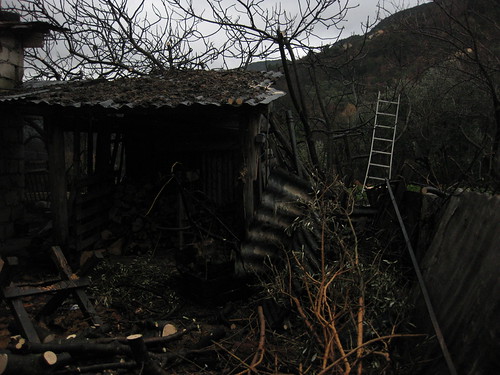by Mike
Azure doesn’t remember the cemetery from the story I wrote. One of my formative travel experiences was here in Pinareddu in 2001 and I’d written a short story in which the cemetery served as a landmark.
She remembers a lot of the other parts of the story though, even one I’d forgotten – the ‘storm.’ On my first night here, sleeping alone in Francois’ empty house, I was terrified as I listened to the wind bang the shutters against the walls all night. It wasn’t even a storm really, just a windy night, but it was so dark and I was so alone that I threw my headphones on, took a sleeping pill and hid under a pillow as soon as the noises started. It was probably 8pm or something. Azure also remembers the part where I walked home from town at night and two dogs came out of the black to bark at me like they were going for the throat. I was sure they were going to kill me, I just about shit myself and ran to the house and probably took another sleeping pill under a pillow.
Azure’s on the back of the scooter as we drive through town and retrace the story. Those damn dogs are still there at the bottom of the hill and farther up I point through the trees to a white balcony, “That’s the room I slept in.” It’s high on the hill above Pinareddu with a complete view of the town, bay and sea.
I take Azure up the road toward Francois’ brother’s house and we stand outside the gate. “I walked into his house and the walls were covered in moths, his dogs were jumping up and snapping at moths under the ceiling fan.” When I had finally arrived on Corsica, after weeks of fantasizing, I was overwhelmed by the experience of travel and this house was folded into the stature of those feelings. It remained large through relived memories and retold stories, but now with Azure it looks small.
My memories of Pinareddu are exhausted so we turn around. We drive down the hill, past Francois’ home, past the beach and the two restaurants and past the cemetery.
“Do you remember the cemetery?” She doesn’t.
Francois had cancer and was dying when he drew the map on a napkin for me. We were at his kitchen table in Bellevue before my first big trip. He said, “The cemetery is the first thing you’ll see coming into Pinareddu, you’ll pass it there on the right.” I could see he was walking the path in his mind as he drew the map, rewalking it, reliving memories from his ancestral fishing village. The black lines ran from Bellevue to Paris to Nice to Bastia and to Ste. Lucia. Then another set of lines showed the five kilometers down to the town, the cemetery and then the road to his brother’s house where I would find a key to Francois’ house. I could stay there if I could get there. It seemed impossibly distant. He must have known that he would never come back. He was too sick.
I made it to Paris and I made it to Nice. Then I made it to Bastia and finally to Ste. Lucia. I was thinking of him as I started walking the winding road, I retraced the lines for him five kilometers down toward the sea and Pinareddu. I imagined that from Bellevue, he was walking through me and looking at the Mediterranean and smelling the trees again. He was passing the cemetery on the right again, and he recognized the people at the restaurants and he surveyed the beach. I imagined him walking past the dogs up the hill to his brother’s house for the key. Then we walked to his empty home where he could remember the smell of the trees and he knew the shutters banged at night and he could see the sea from the balcony.
Though the cemetery was just a landmark on the map, I’m sure his grandparents are buried there and their parents, and when I walked through town I wondered if he would be buried there too. I wondered if, as he walked the town in his mind for the last time, he expected to be buried there himself. He died that summer. He gave me a complicated gift that sparked a new direction in my own life and I never thanked him. Francois, at the end of his life, gave me a map and with it the promise keys in far away places.


















































































































































































